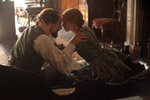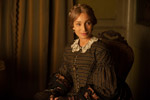Ralph Fiennes The Invisible Woman Interview
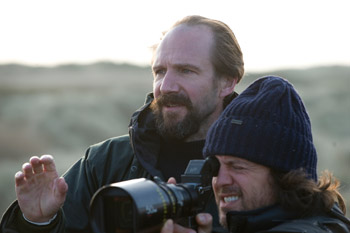
Kristin Scott Thomas and Felicity Jones The Invisible Woman
Cast: Ralph Fiennes, Felicity Jones, Kristin Scott Thomas
Director: Ralph Fiennes
Genre: Biography, Drama, Romance
Rated: R
Running Time: 111 minutes
Synopsis: It is 1885 and Nelly Wharton Robinson, a woman in her late 30s, is living with her husband, George Wharton Robinson, and their sixyear old son Geoffrey in Margate. They enjoy a happy and bustling life running a school for boys of which George is the headmaster. Nelly, who loves the theatre, stages elaborate plays with the schoolchildren, including one called No Thoroughfare: A Drama in Five Acts, written by Charles Dickens and Wilkie Collins. Rather incongruously, her production stars Geoffrey as a lion. But Nelly is hiding a secret. She takes long walks on the beach, lost in her thoughts, oblivious to the melancholy of an English coastal resort in winter. On her return her distracted air catches the attention of Reverend William Benham at the play's dress rehearsal. When he points out there is no lion in the play he is intrigued by her insistence the two playwrights would not have minded her taking such dramatic license.
During the rehearsal, Nelly's thoughts drift to another time. It is 1865 and Nelly, then in her mid-20s, is on a train. Just as quickly, it is 1857 and the 18 year-old Nelly is attending rehearsals with her mother, Catherine Ternan, and older sisters Fanny and Maria, in Manchester at the Free Trade Hall. They have been hired to appear in The Frozen Deep, written by Wilkie Collins, and directed by and starring the famous Charles Dickens. The Ternan women are all renowned actresses, although Nelly, the youngest, shyest and prettiest, does not possess the acting talents of her mother and sisters.
Every aspect of the cheerful, noisy rehearsal is overseen with great skill by Dickens, revealed to the Ternan women as a wonderfully charismatic man in his mid 40s. They meet his good friend Wilkie as well as his family and children, including his wife Catherine Dickens. She sits apart from all the activity, looking tired and disinterested.
After a successful performance, Dickens hosts an exuberant celebration. The Ternan family are charmed by the singing and dancing long after his wife and many of the company have retired to bed. Nelly and Dickens share a moment watching the dawn creep in.
Back in 1885 and Nelly is in the schoolhouse library with Benham. She owns several signed copies of Dickens novels, a writer her husband believes Nelly knew as a child. But Benham's curiosity is piqued again as he glimpses a tiny lock of baby hair within the pages of an original version of The Frozen Deep. It is hastily hidden by Nelly.
In bed later that night, after making love to her husband, Nelly's mind wanders again to 1857. She is attending a reading of David Copperfield by Dickens with her family. They are flattered by the attention he pays them, particularly Nelly, who admits to him she has read the novel twice.
As the affection between the Ternans and Dickens grows, so Dickens becomes increasingly distant from his wife. The Ternans attend Doncaster Races with Dickens and Wilkie. When Dickens is mobbed by adoring race-goers, they recognise the true extent of his celebrity.
Unpacking at their modest London home, Mrs Ternan discovers Nelly's signed copy of David Copperfield and realises the feelings developing between Nelly and Dickens. When Dickens later visits Park Cottage, Mrs Ternan tells him she is conflicted. She is fearful her daughter will not be able to earn a living as an actress but neither does she want Nelly to risk her reputation as the mistress of a wealthy married man.
Back in 1885, Benham has joined Nelly on the beach. She admits she was 18 when she first met Dickens and that she was an also an actress. Benham realises what she is telling him, and that it is something she has kept from her husband, or so she believes.
In an attempt to cheer her up they take Nelly to the home of Caroline Graves, Wilkie's widowed mistress. But Nelly is unamused by their living arrangements. The evening ends with both Nelly and Dickens consumed by a tumult of conflicting emotions and a new understanding of who the other is. Dickens' marriage to a devastated Catherine publically unravels with a letter announcing their separation he sends to The Times. It has a tremendous impact on both his family and the Ternans. Dickens tries to explain to Nelly why he did what he did and compares himself to the flawed, unheroic Pip of Great Expectations, the novel he is working on. Nelly suggests they go away together.
Following an idyllic time together in France, Nelly falls pregnant. But the pregnancy ends tragically in a stillborn baby boy and Nelly is grief-stricken.
They leave France and once back in England board a train to London. Dickens is busy working on Our Mutual Friend as Nelly watches the Kent countryside speeding past. Suddenly the train violently buckles and the world is upturned. Nelly awakes on a grassy verge, slightly injured. A distraught, unharmed Dickens tends to her before she sends him away to help the injured and to keep his travelling companion a secret.
Twenty years later in 1885, preparations for the school performance are in full swing. But Nelly is not there. Instead, she is talking with Benham in a graveyard, where he reveals he knows her real name, Ellen Ternan. With relief Nelly tells him about her life with Dickens, as if trying to make sense of it herself.
Her state of mind much improved, Nelly returns to the schoolhouse, slipping in beside her seemingly unsuspecting husband. Broaching the subject of Benham and Dickens, they are interrupted by a roar of a lion as Geoffrey rushes up to them and is tenderly embraced. Holding hands, his parents watch Geoffrey's joyful performance which is greeted with ecstatic applause.
The Invisible Woman
Release Date: April 17th, 2014
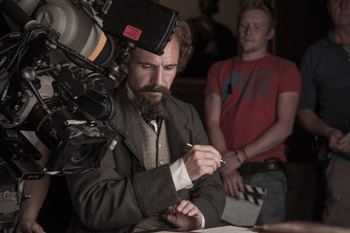 Interview with Ralph Fiennes – Actor, Director and Producer
Interview with Ralph Fiennes – Actor, Director and Producer
Question: Why did you become involved in the project?
Ralph Fiennes: I knew very little about Charles Dickens, I had only read one Dickens novel. I knew nothing about Ellen Ternan and Dickens. I read the screenplay which was good and then I read Claire's book which completely grabbed me. What moved me in terms of a film was a woman who's harbouring a past life that she cannot speak about, that's trapped inside her and that's what affected me. Alongside that was Dickens and the force of Dickens and the creative power of Dickens.
Question: But this was shown to you more as an actor to play Dickens?
Ralph Fiennes: It was suggested, would I like to direct it and possibly play Dickens? Initially having acted and directed at the same time in Coriolanus I didn't particularly want to do that. But as I worked on it, the actor in me fell in love with the idea of playing Dickens, but it was tough to do both.
Question: It seems inconceivable you couldn't have done both. That was the Dickens way.
Ralph Fiennes: Yes, he was in control of everything, every detail of the house and the decoration aspects of his homes and things like that and his children and everything. He was a control freak.
Question: What sort of a man was Dickens as you began to get to know him through the script and through your further reading?
Ralph Fiennes: Energy is the first word that comes to mind, extraordinary energy, the ability to work long hours and then walk and organise events. Social energy, creative energy, intellectual energy. Joy, vitality, wit, exuberance and then on the side flashes of darkness, irritation, very quick to perceive offence in people, quick to feel he's been slighted. Highly sensitive, I think, to his sense of position in the world.
He's very strong in his attitude, he judges and he's opinionated, very funny. If he comes into a room, the room lights up; the room is on fire and he's charming. And there's this other side, he can lash out and with his children, he's very impatient, particularly with his sons who he didn't think were being successful enough.
We show him rehearsing The Frozen Deep, the paint, the size of the canvases, the bits and bobs, the lighting people and the people creating snow effects. And Dickens on top of everything. At the same time he's making sure he gets out the next edition of Household Words and the next chapters for the next book. It's extraordinary.
And his ability to gather people together and he gives them great meals after rehearsals at four or five in the morning. It must have been thrilling and very appealing and very attractive.
Question: Dickens was a good actor and he loved actors and the whole theatrical world. It must have been quite an interesting thing to play with that.
Ralph Fiennes: I find the theatre an extraordinary thing. It takes us out of ourselves and gives us a communal imaginative investment in another story and another world. The theatre then was like films or television series now, the fascination with actors, theatre, new plays, events, farces, comedies and music hall.
Question: When we see the story opening, he's at the height of his power, world famous and in a rather unhappy situation with his wife Catherine...
Ralph Fiennes: My feeling is, Catherine Dickens loved her children and one has to be sympathetic to her because she was pregnant, seemingly every two years of their married life if not more, which must have been tough. Pregnancy was difficult for Catherine. I think she had bouts of post-natal depression. Dickens, I think, exacerbated these problems in his possible rewriting of their marriage as an excuse to get out.
Question: And into his life at this point comes the Ternan family. What do you believe the mother, Catherine Ternan, played by Kristin Scott Thomas, really made of him?
Ralph Fiennes: I think Mrs Ternan, who's been in a marriage which ended sadly with her husband ending up in a mental institute, had to acquiesce or somewhat accommodate Dickens' love for Nelly. In Victorian society, it seems that if the taboo is public then it's unspeakable but if it was never public, there was an understanding. You feel that Dickens quickly was infatuated with Nelly. I feel he did like the sisters, he loved the theatre but ultimately Nelly was what he wanted. I think he was deeply in love with her.
Question: That would explain the overreaction of writing to the Times, an extraordinary thing to do. A man who'd almost persuaded himself...
Ralph Fiennes: Persuaded himself he was a good man and that he was absolutely doing nothing wrong and presented her as a goddaughter. There was great anguish in Dickens and what he was involved in. Going to France where we think he was keeping Nelly, he was a man in a great state of anguish and melancholy or guilt. He knew he was deeply, humanly flawed and that's what Abi and I tried to show with the reading of Great Expectations when Nelly says -Pip is not heroic' and he (Dickens) says -no, he's like all of us'. You know, he can be vain and shallow and that's his way of being honest; he's honest through his work.
Question: What kind of Nelly did you want to give us?
Ralph Fiennes: A lot of how and who Nelly was was a search that I needed answered by whoever was going to play her. A lot of the time I didn't quite know. I felt I wanted someone who, in terms of interior life, could be 18 and in her mid-30s or possibly older. But I didn't want to use make- up to do that. Ellen Ternan disguised her age but we don't go into the detail of her sleight of hand about her age because I felt that was too complicated.
I wanted someone who had great interior resources. Felicity Jones and I met and she read for me very generously and she showed these layers of interior life. Felicity Jones has created a woman of complexity, someone who is astute and can read a situation.
Someone who doesn't open her heart too quickly yet when she does, it's complete. That's what I love about Felicity Jone's performance as the inner life is so strong and I find that very moving. I'm often surprised, having seen it so many times, how I'm moved by Felicity Jones in this role, particularly as the film comes to its conclusion where Nelly speaks about her life and experience with Dickens. That's where the strength of the performance comes into its own.
I quite like films when at the right moment people speak and we listen. There's a scene I worked on with Abi to create this moment of a release, of being able to speak. This scene takes place in a churchyard, I was blown away on the day, and I found Felicity Jones extraordinary. We had at least three or four great takes to choose from.
Question: It must have been a pleasure to work with Kristen Scott Thomas again.
Ralph Fiennes: We're old mates. She said -I want to do your film'. Initially I was sceptical that she actually would be able to. But we managed to work it out and she's fantastic.
Question: You can see why Dickens was taken with the Ternan family.
Ralph Fiennes: They were amazing women, this mother and three extraordinary daughters. We're not sure how strong an actor Nelly was but you feel they all had strong intellects, and were self-taught to a large extent. I found probably another film could have been made if you follow all three. I very much wanted to bring the two sisters into a little more focus than they were in the early drafts. I want the audience to experience the whole family of Nelly and then Nelly emerges as our leading woman but initially to sense the sisterly links and the strengths of these three women together.
Question: You've touched on that precarious sense of holding on to respectability that Mrs Ternan did so bravely. She had brought up her daughters very properlyand she was more conscious to the dangers to Nelly's reputation.
Ralph Fiennes: Yes it must have been a dilemma for her. That's what the scenes with Kristen Scott Thomas tried to address. Dickens was successful, he was wealthy by the standards of the day, he was certainly wealthy as writers went and he probably was very charming. If you're in the theatre, as the Ternans were, you must have seen the way men and women make arrangements for themselves as lovers, outside the norm. I guess, Mrs Ternan, as long as respectability was intact, could accept Dickens as her daughter's lover.
Question: One of the things I liked about your and Abi's script is that you don't have Mrs Ternan saying -oh we're awfully poor and we can't make ends meet'. We understand it without it being pushed in our face. Building that world must have been an interesting process?
Ralph Fiennes: Our production designer Maria Djurkovic says the Victorian period is one of her favourite periods. Her team went into great detail about all aspects and I wanted it to be very accurate. I'm fastidiously accurate to the time. I often think the real thing is always more fascinating than if you're doing fantasy design or a variant. I felt we are dealing with real people who really existed in a specific time.
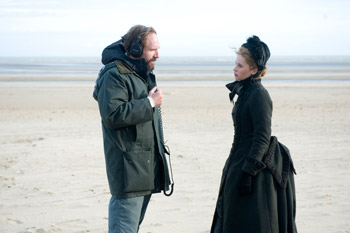 Question: And the reality comes through when you were burning the letters in the bonfire. Instead of it being packets from production or the art department, it feels as if it is real letters they are burning.
Question: And the reality comes through when you were burning the letters in the bonfire. Instead of it being packets from production or the art department, it feels as if it is real letters they are burning.Ralph Fiennes: Every single letter was folded as it would have been and they all contained information. A wonderful girl on production designer Maria Djurkovic's team, Emily Lutyens, who was in charge of all the graphics, went to extraordinary lengths to reproduce every single graphic element, handwriting, print, typeface. If we wanted to show the contents I could have opened any one of those letters we poured on the bonfire, the camera could have filmed it and it would have passed as truthful. Michael O'Connor, who did the clothes, was incredibly, finely detailed about every aspect, the decorations of bonnets and lace around the lady's collar, the corsets and the men's clothes, the weight of the fabric we were wearing. The physical picture becomes and feels lived in.
Question: Dickens was a celebrity in his day, an extraordinarily well-known man. This was not a man who could physically or metaphorically embrace his love in public.
Ralph Fiennes: He was one of the first arts celebrities of the modern era. He was a huge phenomenon like pop stars today. Abi and I thought we could show that in the Doncaster races scene.
Question: And you used the drama of the Staplehurst train crash to show Nelly's recognition she was in a relationship with that kind of man and she makes that sacrifice.
Ralph Fiennes: It was a great idea of Abi to use that drama to show that he's a public man and that takes priority. Under pressure, his public image is the thing he will keep intact. In the film we show him attending to her but then going off and leaving her in the hands of other people while he goes to help other wounded people. But her mother, who actually travelled on the train with her isn't in the film and in reality Dickens made sure mother and daughter were taken off and put in the carriage as soon as he could get them off the site of the accident.
It is deeply unfair to suggest Dickens leaves Nelly wounded on a railway embankment and then goes off. It's not what happened, although we emphasise it in a slightly different way. I felt that the film to me, as I worked on it, was the story of how Ellen Ternan became the mistress. It wasn't the life she led as the mistress. I can't see the drama in it. The drama was a young girl becoming the mistress of a famous man in a particular social world. The conclusion of that becoming is the scene in the cottage near Slough where Dickens settles Nelly in. That became a very important scene to me, that the end of our film is the beginning of their life together with all its weird, shadowy compromises and for Nelly, I think probably a lot of time on her own.
Question: This was no middle-aged infatuation easily satisfied by lust because they lived together on and off for many years.
Ralph Fiennes: I think he did love her but he did his readings. He went off all over the country, on the trains and came back to Slough and later to Peckham where she was living. A bit like marriage is today. A man has to travel often, abroad, business meetings or sales meetings or whatever but people find a way to make a life together.
Question: What was it that frightened you or challenged you the most about portraying him? Was it the big set pieces, or the readings?
Ralph Fiennes: To get the vitality right, I was guided very much by a wonderful woman, Joan Washington who helped me on my performance in Coriolanus and so I have huge trust in her taste and judgement in where the performance is going.
The energy of Dickens, which we see especially in the opening when he's rehearsing in the theatre, and the social life of Dickens, to get that love of life and the buoyancy and that charm to him. I knew people might not like him, that didn't worry me. The best response is when people say -I wasn't sure whether I liked him or didn't like him' and that's great because I love it when people are left going -what do I really think?' and not being told: -it's that or that' and they have to think.
Question: Make-up and hair designer Jenny Shircore has done a marvellous job again. It must have been very reassuring for you to look in the mirror and think -yes, I have the physical appearance'?
Ralph Fiennes: People know Dickens's face from books and pictures and it was important to get that. Yes, it was reassuring to see it and say -there's Dickens, now I've got to act it'. Dickens had such a strong facial hair arrangement, the moustache and the beard, which was much longer than I had it in the film. The hair, which as a young man was very voluminous but thinned a bit, a bit like mine, and then curled and quaffed at the sides. You feel he's a man who cared for his appearance and waistcoats. You feel he would've tweaked his hair and spent time, there's some vanity there.
Question: You've worked with Jenny before as she was doing your Magwitch on Mike Newell's Great Expectations. You've cast your heads of department as carefully as you've cast your cast.
Ralph Fiennes: I think Jenny Shircore is a great artist, no question. She's also a wonderful woman and very supportive and brilliantly, amazingly hard working and dedicated. Her eye for these things is extraordinary. She worked so hard on getting the wig right. I was lucky to have all the people I did.
Question: What do you hope audiences will take away from the film? What do you want them to see?
Ralph Fiennes: I want them to be engaged in the complexity of the relationship. I want them to feel like they're allowed inside the mind and heart of this woman, primarily Ellen. I want them to be engaged in her life and the challenges to her as she negotiates her way with this man who happens to be Dickens but could just be -the writer' or -the famous writer'.
Relationships are complicated and the complications are heightened in this setting because the constraints give it an added tension. There are no rights and wrongs in these things and I want audiences to be emotionally engaged by Nelly but also to believe that they're witnessing the difficulties of how you manage a life with another person on an intimate level.
Have You Seen This?
MORE
- Mission: Impossible Fallout
- Glenn Close The Wife
- Allison Chhorn Stanley's Mouth Interview
- Benicio Del Toro Sicario: Day of the Soldado
- Dame Judi Dench Tea With The Dames
- Sandra Bullock Ocean's 8
- Chris Pratt Jurassic World: Fallen Kingdom
- Claudia Sangiorgi Dalimore and Michelle Grace...
- Rachel McAdams Disobedience Interview
- Sebastián Lelio and Alessandro Nivola...
- Perri Cummings Trench Interview

